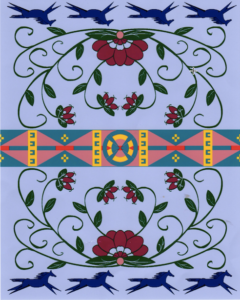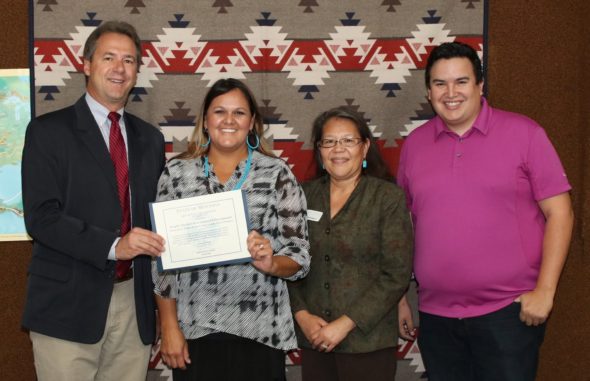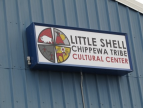Heather Sobrepena-George is the Section Manager for the Montana Department of Commerce’s Indian Country Programs. She oversees the Indian Country Economic Development (ICED) Program, which uses Submittable for three grants, distributing up to $664,000 in state funds per fiscal year to promote economic development in tribal nations and for tribal businesses. Sobrepena-George describes her work as both humbling and inspiring: “Indian Country is resilient, vibrant, and innovative and we get to be a tool of success for individuals, businesses, families, and communities.”
Begun in 2005, the ICED program’s three state-funded grants work in tandem, aiming to create measurable impact for tribal economies and communities, as well as stimulate future investment and support through the power of narrative. Sobrepena-George and others offer many compelling stories.

Theo Huggs’ original Pendleton blanket design.
Theo Huggs, for example, began the River Crow Trading Post with her family in 1993 while working full time for the National Park Service. When she retired in 2009 after 38 years, Huggs was inspired to create a Pendleton Blanket featuring her own design, so she applied for an Indian Equity Fund (IEF) Small Business grant through ICED. IEF grants award up to $14,000 a piece to start-up and expanding Native American businesses in Montana per fiscal year.
The funds she received allowed Huggs to collaborate with the Pendletoncompany and produce 250 blankets, half of which have sold. Huggs explains the inspiration behind the design, featuring horses, flowers, and Crow symbology: “The horse is a major part of our culture, and my family has been very involved in the Indian Relay Races, so I chose running horses. We’re very close to nature and we love flowers, like our allies the Nez Perce tribe. The center is a Crow design inspired by traditional parfleche cases.”
IEF grants support a wide range of endeavors. Most recently, funds have been awarded to undertakings as various as trucking, vacation rentals, a BBQ food truck, and gardening. IEF’s are also quite competitive – according to Sobrepena-George, only 30% are funded and the review process is very involved: “Between the local and state review committees, we have about 75 individual reviewers with eyes on the applications.” The intricacies of this process prompted the program’s move to Submittable, serving an administrative function by providing ICED “the ability to meet demand without adding the additional HR cost.”
The application process surrounding two other ICED grant programs is more limited in scope. In the 2016 fiscal year, the Native American Business Advisor (NABA) Program had nine applicants and eight were awarded grants. Funding goes to community-based organizations, tribal colleges, and tribal government organizations. These institutions must be able to offer business and credit counseling, and support to private sector businesses. In addition to many other services, NABA programs are required to help at least 12 Native American Businesses apply for IEFs per fiscal year. NABAs receive valuable technology training, and in turn provide fiscal leadership and resources within their communities.

People’s Partner from Community Development was recognized by Montana Governor Steve Bullock in 2016 for their work as an NABA.
People’s Partner for Community Development (PPCD) is an NABA serving the Northern Cheyenne in Lame Deer. Executive Director Sharon Small says, “The program has made such a big impact on our community. Over the past five years, we’ve probably assisted 35 new or established businesses. We used to have just a grocery story and a gas station and a few small construction businesses — next week we’re opening a business center with space for 13 businesses. We needed office space and space for artists who didn’t have anywhere to set up their artwork, jewelry, and beadwork.”
PPCD offers workshops focused on applying for IEF grants, and Michael Steelman attended one. He was looking to expand his contractor business but didn’t have sufficient equity or collateral to get the equipment he needed. Through classwork and one-on-one counseling offered by PPCD, Stellman was awarded an IEF to get a dump trailer and skid steer that increased his portfolio of customers and his revenue. Although Small notes that the demand for PPCD services at times exceeds the organization’s staff and resources, she’s motivated by what they do, by “the end results — actually having a business established and seeing clients do work on the reservation. They are boosting our economic environment.”
ICED also uses Submittable for Tribal Business Planning Grants, for which there are eight eligible tribes in Montana, all of which were funded in 2016. The purpose of these grants is to support the implementation of business planning strategies and activities with up to $28,000 per governing body. Examples of previously funded projects include the Little Shell Tribe’s expansion of their Tribal Visitor Center in Great Falls, and the Blackfeet’s development of recreational property for Glacier National Park visitors. Applications must be based around activities with measurable deliverables such as business plan development, feasibility studies, and physical business infrastructure planning, such as zoning.

Little Shell Tribal Visitor Center in Great Falls, MT.
The three grant programs offered by ICED aim to promote economic development in Indian Country on a number of different levels, from the individual to the tribe, from the training to funding. Sobrepena-George says, “The businesses that we fund impact every sector of the local and larger Montana economy: commodities, goods, services, and experiences.” While the large IEF applicant pool can be challenging, Sobrepena-George hopes to reframe rejections by “turning application denials into opportunities for technical assistance and growing the private sector economy on reservations in Montana.” In fact, she cites an example from this year, when an applicant who was advised of their non-fundable application sought help from an NABA, revised their grant application and was successful.
When asked where she sees the grants world headed, Sobrepena-George notes the trend away from paper applications and the heightened importance of cyber security. She also commends the ability to remotely manage the grant application, review and reward process, as well as the capacity to integrate an online application platform with contracting and project management.
Sobrepena-George admits that she experienced resistance from program managers, applicants, and local review committee members when Indian Country Programs began using Submittable. Still, “when folks saw that they could access applications in real time, make changes, remotely communicate decisions and questions, perform reviews according to individual needs (rather than needing to meet in person), and have one central place to access applications, they became more comfortable with the process.”
The ICED program is doing important work for Montana and, according to Sobrepena-George, they are excited to be doing it. “Businesses are grateful for the awards and we’re honored to be a small part of diversifying the economy in Indian Country one business at a time.”
Note: The opinions expressed by interviewees of the Submittable blog are theirs alone and do not necessarily reflect the opinions of Submittable.

Heather Sobrepeña-George is a descendant of the Crow (Apsaalooke) and the Miniconjou band of the Cheyenne River Sioux and is a third generation Filipino-American. Heather is the Section Manager of the Indian Country Programs for the Montana Department of Commerce and oversees the Indian Country Economic Development (ICED), the State Tribal Economic Development (STED) Commission, Montana Indian Language Program (MILP), and the Native American Collateral Support (NACS) Programs. The outcomes of these program support all activities on a continuum of business development including inclusive economic policy development between tribal governments and the State of Montana, Native American private sector development on reservations, access to capital, entrepreneurial training, business planning for tribal governments, as well as language conservancy and perpetuation. Heather also works within her role with the Montana Office of Tourism and Business Development Bureau to develop tribal tourism opportunities in the larger network of local, domestic, and international tourism opportunities.